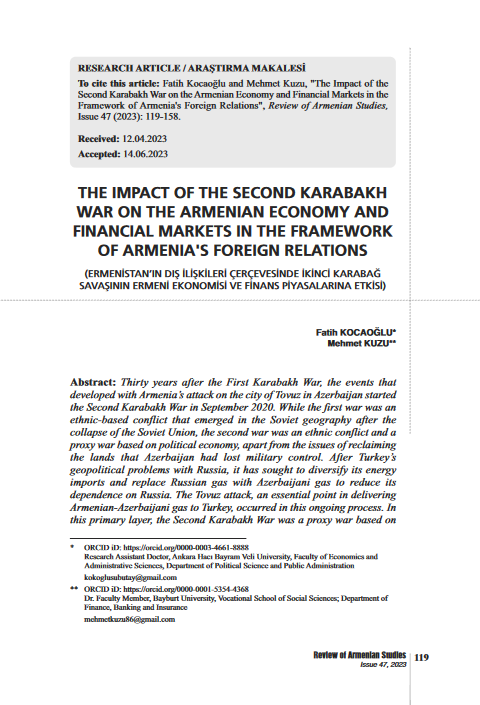THE IMPACT OF THE SECOND KARABAKH WAR ON THE ARMENIAN ECONOMY AND FINANCIAL MARKETS IN THE FRAMEWORK OF ARMENIA'S FOREIGN RELATIONS
Download PDF :


Review of Armenian Studies
Publication Date: 2023
Authors: Fatih KOCAOĞLU, Mehmet KUZU
Thirty years after the First Karabakh War, the events that developed with Armenia’s attack on the city of Tovuz in Azerbaijan started the Second Karabakh War in September 2020. While the first war was an ethnic-based conflict that emerged in the Soviet geography after the collapse of the Soviet Union, the second war was an ethnic conflict and a proxy war based on political economy, apart from the issues of reclaiming the lands that Azerbaijan had lost military control. After Turkey’s geopolitical problems with Russia, it has sought to diversify its energy imports and replace Russian gas with Azerbaijani gas to reduce its dependence on Russia. The Tovuz attack, an essential point in delivering Armenian-Azerbaijani gas to Turkey, occurred in this ongoing process. In this primary layer, the Second Karabakh War was a proxy war based on the economy and politics between Russia and Turkey. With the war, Iran supported Armenia, and Israel supported Azerbaijan. In the secondary layer, it was a geopolitically based proxy war between Israel and Iran at a weaker level. Since the founding element of the war was the economic-political plane, this study examines the economic-political dimension of the war for Armenia. In this context, this study aims to analyze the effects of the Second Karabakh War on the Armenian economy and financial markets within the framework of Armenia’s relations with Russia and the Western world. According to the results, during the process that turned into a war, the Armenian economy contracted with the increasing public expenditures during the war, and economic and financial fragilities increased. After the armistice, Turkey’s internal economic-political and growing confidence in solving the problem provided capital inflows from Russia and the West, supporting economic growth and financial markets. However, the Armenian economy has been susceptible to the geopolitical and military tensions that have risen during the post-war period. On the other hand, Western and Russian capital are energizing the Armenian economy in alternative ways according to the changing geopolitical and alliance system conditions. Russia’s relative influence in this dynamic is more significant. At a higher level of analysis, the main reason for this is Armenia’s varying relations with Russia and the Western alliance. As Russia’s positive impact on the Armenian economy decreased in the post-war period, this effect was replaced with the positive impact of Western capital on the Armenian economy.
Please click here to access the article.





























